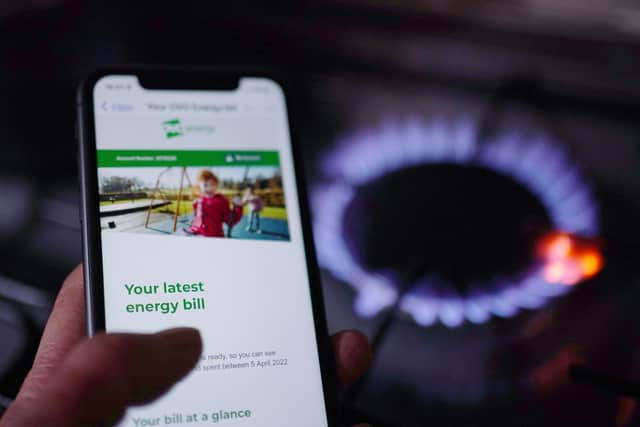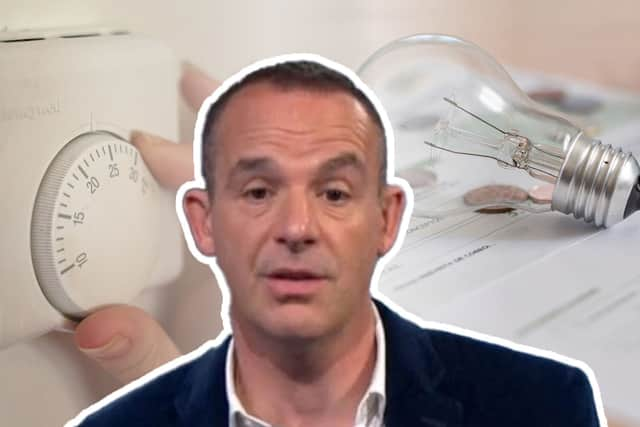What is new Ofgem energy price cap for October 2022 - what does it mean and how does it work?
and live on Freeview channel 276
Ofgem has confirmed an 80% rise in the energy price cap, sending the average household’s yearly bill from £1,971 to £3,549 from October.
The cap will come into effect for around 24 million households in England, Scotland and Wales on default energy tariffs on October 1, and will remain in place until December 31, when it will be adjusted again.
Advertisement
Hide AdAdvertisement
Hide AdThe 4.5 million pre-payment meter customers, who are often the most vulnerable and already in fuel poverty, will see an even more punishing increase, with their average annual bill set to go up to £3,608.
Ofgem’s chief executive Jonathan Brearley warned of the hardship energy prices will cause this winter and urged the incoming Prime Minister and new Cabinet “to provide an additional and urgent response to continued surging energy prices”.
Mr Brearley said: “We know the massive impact this price cap increase will have on households across Britain and the difficult decisions consumers will now have to make. I talk to customers regularly and I know that today’s news will be very worrying for many.


What is the Ofgem energy price cap?
Ofgem - or the Office of Gas and Electricity Markets - is the UK’s energy regulator.
Advertisement
Hide AdAdvertisement
Hide AdIndependent of government, it says it works to keep energy prices as low as possible, protect consumers and drive the UK towards its net-zero target.
Part of its role is to set a cap on what suppliers can charge people who are on default - i.e. standard variable - tariffs for a unit of energy, so as to stop them from being ripped off.
So, what you’re billed will almost certainly be above the price cap because it doesn’t determine the maximum you will have to pay for your energy usage.
A typical household’s bill will sit around 55% above the price cap.
Advertisement
Hide AdAdvertisement
Hide Ad

Why is the energy price cap going up?
Ofgem said the increase reflected the continued rise in global wholesale gas prices, which began to surge as the world unlocked from the Covid pandemic, and had been driven still higher to record levels by Russia slowly switching off gas supplies to Europe.
Mr Brearley explained: “The price of energy has reached record levels driven by an aggressive economic act by the Russian state.
“They have slowly and deliberately turned off the gas supplies to Europe causing harm to our households, businesses and wider economy.
“Ofgem has no choice but to reflect these cost increases in the price cap.”
Advertisement
Hide AdAdvertisement
Hide AdThe UK currently imports around half of its gas requirements.
While Chancellor Nadhim Zahawi blamed Vladimir Putin for driving up the price cap.
“While Putin is driving up energy prices in revenge for our support of Ukraine’s brave struggle for freedom, I am working flat-out to develop options for further support.
“This will mean the incoming Prime Minister can hit the ground running and deliver support to those who need it most, as soon as possible.”
Advertisement
Hide AdAdvertisement
Hide Ad

What government support is available?
The said the increase in the energy price cap would cause “stress and anxiety” for people, but that the Government was working to develop more options to support households.
“I know the energy price cap announcement this morning will cause stress and anxiety for many people, but help is coming with £400 off energy bills for all, the second instalment of a £650 payment for vulnerable households, and £300 for all pensioners,” he said.
However Ofgem chief executive Jonathan Brearley said “the new Prime Minister will need to act further to tackle the impact of the price rises that are coming in October and next year”.
No immediate extra help will be announced by Boris Johnson’s Government, with major financial decisions being postponed until either Liz Truss or Rishi Sunak is in No 10 after the Tory leadership contest.
Advertisement
Hide AdAdvertisement
Hide AdFuel poverty charities immediately called on the Government to urgently extend the household support package announced in May – when the price cap was predicted to reach around £2,800 in October – “to prevent the bleakest of winters”.
And the consumer watchdog said the Government’s financial support for all households must increase from the current £400 to £1,000 – or from £67 to £167 per month from October to March.


What has Martin Lewis said about the energy price cap?
Martin Lewis, who runs the Money Saving Expert website, has urged the Government to provide more help to people, saying “live will be lost this winter”.
He told the Today programme: “This is a catastrophe, plain and simple. Unaffordable.
Advertisement
Hide AdAdvertisement
Hide Ad“If we do not get further government intervention, on top of what was announced in May, then lives will be lost this winter.
“Too many people to think about, because of these unaffordable, terrible, rises in energy bills.
“We are in an absolutely horrendous situation, and it is going to get even worse in January when the cap for somebody on typical use will move up to over £4,000.”
What could the energy price cap rise to in January?
Based on Wednesday’s gas prices, experts at consultancy Auxilione think the cap will reach £5,210 in January 2023 and £6,823 in April.
Advertisement
Hide AdAdvertisement
Hide AdPhilippe Commaret, the managing director of energy giant EDF, has warned that half of UK households could be in fuel poverty in January as a result of rocketing prices, while Which? has urged the Government to raise its energy bills discount by at least 150% or risk pushing millions of people into financial distress.
How is the price cap calculated?
Ofgem determines its energy price cap by calculating how much it would cost a typical energy supplier to supply an average home.
It does this by analysing several factors that impact our energy bills, as well as usage and market data over a review period.
These include:
- Wholesale gas and electricity costs (i.e. what it costs suppliers to buy energy)
- Network costs (e.g. what it costs suppliers to maintain energy infrastructure, like pipes and wires)
- Social and environmental obligations (for example, the cost of adhering to government climate policies, including green levies)
- Supplier operating costs and margin (roughly 2% of the average bill under the price cap)
- Headroom allowance (an amount that helps suppliers manage unexpected costs, thus theoretically allowing them to offer competitive deals)
- Taxes, like VAT
The factor that’s driven the major increase to the price cap has been wholesale costs.
Comment Guidelines
National World encourages reader discussion on our stories. User feedback, insights and back-and-forth exchanges add a rich layer of context to reporting. Please review our Community Guidelines before commenting.